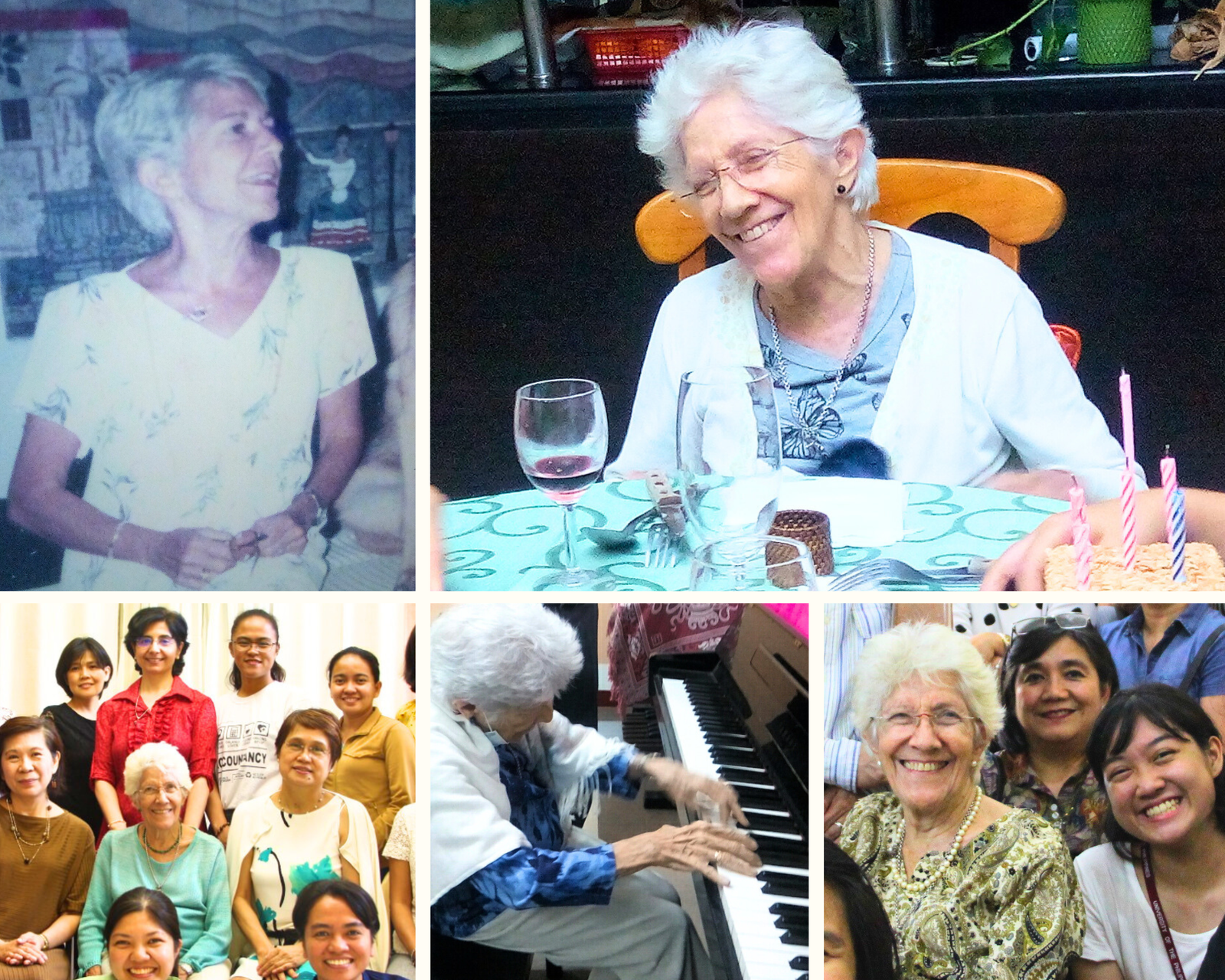
Holy Gospel of Jesus Christ according to Saint Luke 1,39-45
Mary set out in those days and traveled to the hill country in haste to a town of Judah,
where she entered the house of Zechariah and greeted Elizabeth.
When Elizabeth heard Mary’s greeting, the infant leaped in her womb, and Elizabeth, filled with the holy Spirit,
cried out in a loud voice and said, “Most blessed are you among women, and blessed is the fruit of your womb.
And how does this happen to me, that the mother of my Lord should come to me?
For at the moment the sound of your greeting reached my ears, the infant in my womb leaped for joy.
Blessed are you who believed that what was spoken to you by the Lord would be fulfilled.”
Impossible missions are to give glory to God.
Luis CASASUS President of the Idente Missionaries
Rome, December 22, 2024 | IV Sunday of Advent.
Mic 5: 1-4; Heb 10: 5-10; Lk 1: 39-45
A few weeks ago I was visiting our mission in Chiang Mai, Thailand’s second city, just after the terrible floods that destroyed houses and small businesses, taking everyone by surprise, as the monsoon rains started earlier than usual. The army was still cleaning some areas and distributing drinking water. On our way to the city center, I noticed a seven-year-old girl who, in tears, was helping her parents to remove the mud from what was still standing of their house. The next day, when I passed by that place again, that same little girl was helping her neighbors clean up the mud… and the third day, I saw her in the house across the street, doing the same thing….
Today, when the Gospel reminds us of Mary’s visit to her cousin Elizabeth, I evoke the image of that little Thai girl. No doubt, Mary was very young, but she set out on her journey because she felt the breath of the Holy Spirit, the same Spirit who urges each one of us to do good… but she was truly obedient, because she was Immaculate. In her life we see how we can be when we do not allow ourselves to be carried away by the arrogance and pride of our judgments or the fear of setting out on the road.
In all cases, the Holy Spirit surprises us, surpassing the expectations of those who wish to do good and those who live mediocrely. His inspiration is absolutely free, unpredictable. We see this in the First Reading, when the prophet Micah announces a “ruler of Israel” who will arise from the insignificant town of Bethlehem, born of Ephratah, a small branch of the tribe of David. Undoubtedly, everyone thought they were referring to a powerful king, capable of changing the disastrous situation of Israel, scourged by the corruption of its rulers and the abuse of all those who had any responsibility, not to mention the deplorable moral life that, at that time, 800 years before Christ, had destroyed many families and the entire society.
All this, exactly as we see today, because of the madness of wanting to live without God. This is what Pope Benedict XVI denounced:
It is the forgetfulness of God himself that plunges human societies into a form of relativism that inevitably gives rise to violence. When the possibility of everyone referring to an objective truth is denied, dialogue becomes impossible and violence, openly declared or concealed, becomes the rule of human relations (7 DEC 2012).
Again, Providence goes beyond what we think we read in the signs and prophecies, which in reality announced the coming of a very different King, who would not eliminate the pain and evil from the world, but would show everyone that it is always possible to live differently, in the presence of Yahweh, fulfilling his will and, for that reason, being able to walk with hope. Perhaps for this reason, the genial St. Augustine said that peace is tranquillitas ordinis, that is, the stillness that is obtained by being faithful to the order desired by God.
Yes, Christ comes with peace, which we can feel in our hearts, in spite of our sins and little faith, in spite of the power of evil in the world. And, moreover, this peace can be transmitted, not like the fragile and ephemeral peace that sometimes gives the world. It makes us capable of looking at every human being as our brother, which cannot be achieved with treaties, ideologies or control of people and nations. It is a gift, as we remember in every Eucharist:
Peace I leave with you; my peace I give you. I do not give it to you as the world gives it. Do not be anxious and do not be dismayed (Jn 14: 27).
Indeed; it is not about a tactic or a better organization; it is not even about a way of life, however necessary such efforts may be. Peace is not simply something we build, nor is it a state or attitude of the person, as a well-meaning psychologist would tell us. As Micah’s text ends today: He himself will be peace.
—ooOoo—
All of the above are not beautiful theological or moral phrases. When there is a lack of peace between people, there is always someone who has felt hurt, attacked. Sometimes recently, sometimes a long time ago; sometimes he will see bad intentions in his neighbor and sometimes a simple lack of sensitivity. But his reaction will inevitably be some form of anger or a painful silence. In any case, God is not present, only the character of the protagonists.
When there is a lack of peace in a family or community, it is common to hear phrases like these from its members:
– They never inform me of anything.
– They are not interested in my health and work difficulties.
– I have decided not to give my opinion; they never listen to me.
– It is better not to talk, so as to avoid problems.
… and the like. Although they may have a part of truth, the essential thing is that, in these situations, our gaze on God disappears, our enthusiasm to serve everyone, forgetting the first need of our neighbor: peace, what Christ gave in the first place when he presented himself to his disciples, especially when fear gripped them, as in the Cenacle:
On the evening of that first day of the week, when the disciples were gathered together behind closed doors for fear of the Jews, Jesus entered and standing in the midst of them, said:
Peace be with you!
When he had said this, he showed them his hands and his side. When the disciples saw the Lord, they rejoiced (Jn 20: 19-20).
Mary’s willingness to help Elizabeth is often emphasized in her visit, but perhaps this was not the most important thing. She was not an expert, although she was beginning to feel the effects of her own gestation. She understood very well that peace begins with presence, by our interest and desire to accompany in all the endeavors and desires of those who are close to us. I would dare to say it with some verses:
It was not such an urgent thing, Mary.
Besides, Elizabeth had at her side
a very expert team of maidens
ready to help her in her pregnancy.
All was well in Ain Karim,
its kindly vineyards… and that miracle.
But you hurried
because the most important thing was missing
your silent peace… and that embrace.
Things were neither easy nor comfortable for Mary, who had to suffer incomprehension, flee to Egypt and then contemplate in anguish the Passion and Death of her Son. But Providence, time and again, chooses people who are inexperienced, or who are not at the best moment of their lives, or sinners like you and me, to make visible the glory of the Father in our littleness.
We should not think that this littleness is due to the obvious fact that most of us are not geniuses, but because our faith is small, our faithfulness incomplete and our prayer is not entirely continuous. God keeps his word if we approach another person in his name, in the name of his peace. This is not our doing, as St. Paul reminds the person who lives in a state of prayer: Do not be anxious about anything, but on every occasion, by prayer and supplication, present your requests to God and give thanks to him. And the peace of God, which surpasses all understanding, will guard your hearts and your minds in Christ Jesus (Phil 4: 6-7).
Today, the last Sunday of Advent, is the time to remember that Christ comes with the intention of asking for our cooperation; he is not willing to do anything alone. Mary’s response is always a “Yes” to God’s plans. From her acceptance of the mission communicated to her by the archangel Gabriel to her diligence in visiting Elizabeth. Here I am, is the answer to God’s continuous question: Where are you? It is not a question of asking for my coordinates, but of knowing my willingness to do something in His name, no matter if it is an idea of mine, an indication from a superior or having to go through a difficult state of health, emotional turmoil or uncertainty.
In Paradise, Adam heard that question and hid behind a tree. He was afraid to be in the presence of God the Father. On the contrary, Abraham, Moses, Jeremiah and all those we call saints, answer “Here I am”. These were the words of Mary, who declares herself to be the servant of the Lord.
God does not call us by our talents, He does not need them. They are a gift we receive from Him. He needs us, our whole person, when we are happy and when we suffer. As Moses reminded the Israelites: The Lord was fond of you and chose you, though you were not the most numerous people, but the least of all (Deut 7: 7).
Even more clearly: Is this not the common content of all the Beatitudes?
That explains the central content of the Second Reading. It does not represent a change in liturgical habits or a disdain for rites, but the possibility of continually offering God something of our fragile existence: Behold, I have come to do your will. The other resolutions, the other intentions, good or bad, can change, disappear or become impossible desires, but only the desire to be God’s servant can give direction and meaning to every instant. And his light becomes visible.
May I illustrate with an old story?
An oriental king of a country that worshipped the sun wanted to build a temple for him. He sent for three architects and asked each one to give him a model of the temple.
After many days they returned to present their models. The first prepared a beautifully carved stone temple. The king admired it and called the second. His was of pure gold, and the walls were polished and burnished until they reflected the sun on all sides. The king was delighted, and the architect thought he had won the prize. But the third brought his little model and, it turned out, it was all glass, so that the sun could enter everywhere and spontaneously fill it with its light and glory.
The king said: Oh, this is the true temple of the sun; this is his own proper sanctuary, which allows him to enter into every chamber, and has no other glory than his own perfect light.
_______________________________
In the Sacred Hearts of Jesus, Mary and Joseph,
Luis CASASUS
President












